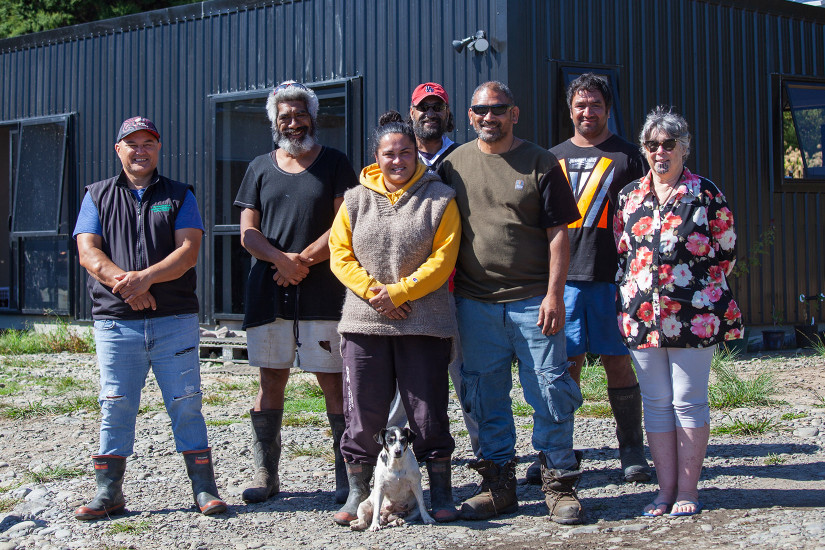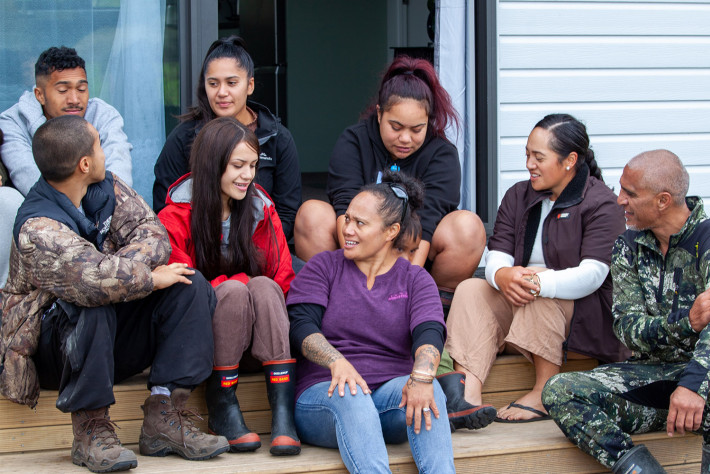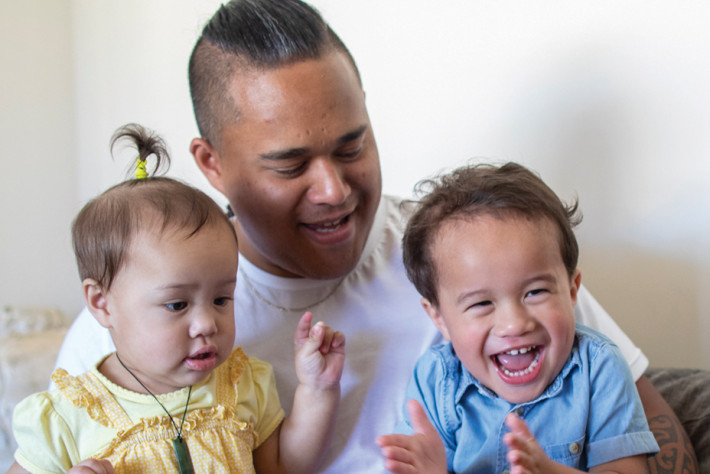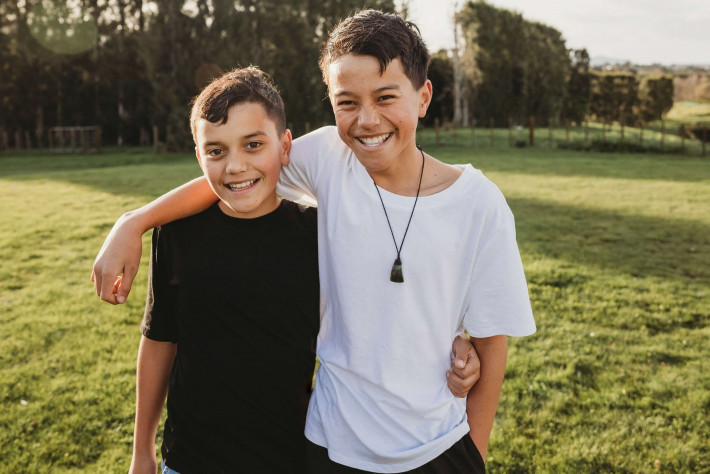Data helps Te Tairāwhiti community Nā ngā raraunga i āwhina te hapori o Te Tairāwhiti
Data helps Te Tairāwhiti community Nā ngā raraunga i āwhina te hapori o Te Tairāwhiti
Tatau tātou - All of us count
Thanks to data about the housing and health status of people in Te Tairāwhiti, Willie Te Aho and Toitū Tairāwhiti Housing Limited were able to work with government to get 51 new homes built in the community. Another 150 are planned.
Hear how this helped two Te Tairāwhiti whānau in the videos below.
Hautai and Joseph's story Te pūrākau a Hautai rāua ko Joseph
Like many families in Te Tairāwhiti, Hautai and Joseph could not find anywhere to rent. They had no choice but to live in a tent for six months.
That is when they heard about the housing initiative from Willie Te Aho and Toitū Tairāwhiti Housing Limited.
Thanks to data about their community, and the housing initiative, Hautai and Joseph could fulfil their dream of being homeowners.
[Background music: '35' by Ka Hao feat. Rob Ruha]
[Visuals: Aerial shots of the Raukokore coastline]
[Onscreen text: Raukokore]
[Visual: Medium shot of a man speaking to camera, standing near the coastline]
[Onscreen text: Willie Te Aho, Te Whānau-ā-Apanui]
Willie Te Aho: My people of Te Whānau-ā-Apanui believe that it's important for us to be able to control our own destiny. That's mana motuhake for us.
[Visuals: Groups of people arriving at and listening to a speech outdoors]
Willie: What's happened over the last two years is that by working with government officials, and them working with us, we have been able to access data that means something to us.
[Visual: Willie near the coastline]
Willie: In the long run it means we get better investment in hauora; in our health. In the long run it means we get better investment in our housing, and that's what we want to see.
[Visual: Aerial shot of the Oruaiti coastline]
[Visual: Aerial shot of a new house on a section in the middle of bush on a hill]
[Onscreen text: Oruaiti]
[Visual: A man and a woman, Joseph and Hautai, sit on chairs in front of the house, with a dog between them. Hautai speaks.]
Hautai Komene: 2020, we couldn't find anywhere to rent at the time.
[Visual: A photo of Hautai in front of a campsite]
Hautai: We lived in our tent for about five or six months.
[Visual: Joseph and Hautai in front of the house]
[Onscreen text: Hautai Komene, Te Whānau-ā-Apanui]
Hautai: Uncle Willie came to us and he told us that they were starting up a housing scheme.
[Visual: Aerial shot of the house]
[Visual: Hautai outside the house, gesturing to it]
Hautai: This is our new whare, our whare hou. So we're on gas and solar.
[Visual: Joseph and Hautai in front of the house]
[Onscreen text: Joseph Rurehe, Ngāi Tūhoe]
Joseph Rurehe: It was like a light at the end of the tunnel, for a start, when the kaupapa first got spoken about.
[Visual: Hautai standing in the kitchen preparing food, among four other adults]
[Visual: Joseph and Hautai in front of the house]
Joseph: I was like sitting there one morning and I said to Hautai, “Hang on, I’ll just pinch myself, babe.”
Hautai: But it was just different to be in a house again. I thought I’d be renting for the rest of my life, really. It’s a dream come true to own your own home, on your own whenua.
[Visual: Aerial shot of the house, with bush surrounding it]
[Visual: Willie standing near the coastline]
Willie: Data is important. Data underpins the needs of our whānau, and when we understand the needs it's easier for us to plan on how we deliver on those needs.
[Visual: Aerial shot of the coastline]
[Visual: Willie, Joseph, Hautai, four other adults and a dog stand in a group in front of the house, facing the camera. They smile]
[Onscreen text: Your data can help your community.]
[Onscreen graphic: The words "Tatau tātou" transform into "All of us count" as a haehae whakarare graphic appears underneath, with the 'Census | Stats NZ' logo below]
Data is important. Data underpins the needs of our whānau, and when we understand the needs, it's easier for us to plan on how we deliver on those needs.
Willie Te Aho
Toitū Tairāwhiti Housing Limited
Irene and Tahi's story Mātakina te pūrākau o Hautai rāua ko Hōhepa
Irene and Tahi shared their old two-bedroom home with five other adults and three mokopuna. Life was difficult for them all, and they faced a higher risk of health complications than they might have in other living arrangements.
Fortunately, thanks in part to the data Willie Te Aho and Toitū Tairāwhiti had access to, Irene and Tahi were able to move into a new home.
The change for them, and all their mokopuna, has been incredibly positive.
[Background music: '35' by Ka Hao feat. Rob Ruha]
Willie Te Aho: It’s important for us to have accurate information on the status of our people.
What's happened over the last two years is that by working with government officials, and them working with us, we have been able to access data that means something to us, and to use that information to inform better investments, better decisions for the future housing and health of our people.
Irene Hitaua: That house over there, the existing house, it housed seven adults and three mokopuna, and it’s a two-bedroom home.
The journey begun for us in February last year. There was just a big call-out all about the housing crisis we have here in Te Tairāwhiti.
Tahi Hiroki: It was hard for all of us to see ourselves in the long-term future around owning a home. It’s given us a bit of time to breathe
and feel secured now that we’ve got this.
Irene: It’s just like a dream. This is a dream come true.
For me, I never thought this would happen. I want to know that my children, their future is okay, for their children.
Willie: I love attending each of the openings of our whare. It’s inspiring to watch whānau talking about their journeys, where they’ve come from, where they are, and where they’re heading.
We have been able to access data that means something to us, and to use that information to inform better investments and better decisions for the future housing and health of our people.
Willie Te Aho
Toitū Tairāwhiti Housing Limited



